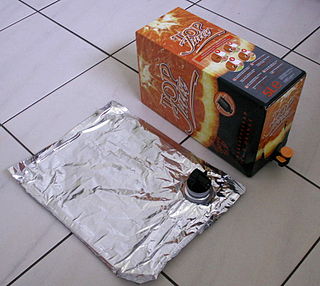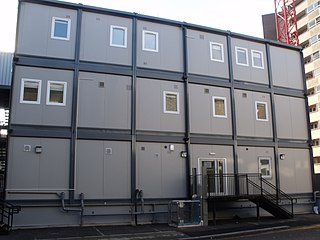Related Research Articles
The automotive aftermarket is the secondary parts market of the automotive industry, concerned with the manufacturing, remanufacturing, distribution, retailing, and installation of all vehicle parts, chemicals, equipment, and accessories, after the sale of the automobile by the original equipment manufacturer (OEM) to the consumer. The parts, accessories, etc. for sale may or may not be manufactured by the OEM.

A corkscrew is a tool for drawing corks from wine bottles and other household bottles that may be sealed with corks. In its traditional form, a corkscrew simply consists of a pointed metallic helix attached to a handle, which the user screws into the cork and pulls to extract it. Corkscrews are necessary because corks themselves, being small and smooth, are difficult to grip and remove, particularly when inserted fully into an inflexible glass bottle. More recent styles of corkscrew incorporate various systems of levers that further increase the amount of force that can be applied outwards upon the cork, making the extraction of difficult corks easier.

A bag-in-box or BiB is a container for the storage and transportation of liquids. It consists of a strong bladder, usually made of several layers of metallised film or other plastics, seated inside a corrugated fiberboard box.

The Benchmade Knife Company is an American knife manufacturer based out of Oregon City, Oregon.

The open-design movement involves the development of physical products, machines and systems through use of publicly shared design information. This includes the making of both free and open-source software (FOSS) as well as open-source hardware. The process is generally facilitated by the Internet and often performed without monetary compensation. The goals and philosophy of the movement are identical to that of the open-source movement, but are implemented for the development of physical products rather than software. Open design is a form of co-creation, where the final product is designed by the users, rather than an external stakeholder such as a private company.

Babcock & Wilcox Enterprises, Inc. is an American energy technology and service provider that is active and has operations in many international markets with its headquarters in Akron, Ohio. Historically, the company is best known for their steam boilers.

A Hills Hoist is a height-adjustable rotary clothes line, designed to permit the compact hanging of wet clothes so that their maximum area can be exposed for wind drying by rotation. They are considered one of Australia's most recognisable icons, and are used frequently by artists as a metaphor for Australian suburbia in the 1950s and 1960s.
Wine accessories are things that may be used in the storage or serving of wine. Wine accessories include many items such as wine glasses, corkscrews, and wine racks.

Kirkbi AG v. Ritvik Holdings Inc., popularly known as the Lego Case, is a decision of the Supreme Court of Canada. The Court upheld the constitutionality of section 7(b) of the Trade-marks Act which prohibits the use of confusing marks, as well, on a second issue it was held that the doctrine of functionality applied to unregistered trade-marks.

A portable, demountable or transportable building is a building designed and built to be movable rather than permanently located.

The Polivoks is a duophonic, analog synthesizer manufactured and marketed in the Soviet Union between 1982 and 1990. It is arguably the most popular and well-known Soviet synthesizer in the West, likely due to the uniqueness of both its appearance and sound.
Liebert Corporation was a global manufacturer of power, precision cooling and infrastructure management systems for mainframe computer, server racks, and critical process systems headquartered in Westerville, Ohio. Founded in 1965, the company employed more than 1,800 people across 12 manufacturing plants worldwide. Since 2016, Liebert has been a subsidiary of Vertiv.

A shelf is a flat, horizontal plane used for items that are displayed or stored in a home, business, store, or elsewhere. It is raised off the floor and often anchored to a wall, supported on its shorter length sides by brackets, or otherwise anchored to cabinetry by brackets, dowels, screws, or nails. It can also be held up by columns or pillars. A shelf is also known as a counter, ledge, mantel, or rack. Tables designed to be placed against a wall, possibly mounted, are known as console tables, and are similar to individual shelves.

Fisk metallic burial cases were patented in 1848 by Almond Dunbar Fisk and manufactured in Providence, Rhode Island. The cast iron coffins or burial cases were popular in the mid–19th century among wealthier families. While pine coffins in the 1850s would have cost around $2, a Fisk coffin could command a price upwards of $100. Nonetheless, the metallic coffins were highly desirable by more affluent individuals and families for their potential to deter grave robbers.
Bodegas Vicente Gandia , is a Valencian wine producer and seller company founded in 1885. Hoya de Cadenas, its family-owned estate, is located in Utiel, Spain. The cellar produces and sells wines from different appellations of Origin including Utiel-Requena, Valencia, Alicante, Rioja, Ribera del Duero, Rías Baixas, Rueda and cava.

Bespoke describes anything commissioned to a particular specification. In contemporary usage, bespoke has become a general marketing and branding concept implying exclusivity and limited runs.

Eurorack is a modular synthesizer format originally specified in 1995 by Doepfer Musikelektronik. It has since grown in popularity, and as of 2022 has become a dominant hardware modular synthesizer format, with over 15,000 modules available from more than 1000 different manufacturers ranging from DIY kits and boutique, cottage-industry designers to well-known, established synth mass-manufacturers like Moog and Roland.

Kenwood Vineyards is a winery in Kenwood, California, located on Highway 12 in the Sonoma Valley wine country. It is currently owned by Pernod Ricard Winemakers.

Vinotemp International is a manufacturer of wine storage units. It manufactures and distributes wine cabinets, racking, cooling systems, and wine cellars.

Farrow and Jackson was a London engineering, manufacturing and distribution company supplying equipment and merchandise to the wines, spirits and aerated beverages trades for more than a century starting in about 1860.
References
- ↑ "About Wine Cellar Innovations". Wine Cellar Innovations. Retrieved 8 May 2016.
- ↑ "DIY Network". DIY Network. Retrieved 2016-04-20.
- ↑ "Biggest Basement Ever". DIY. Retrieved 2016-04-20.
- ↑ "WNKU Broadcast" . Retrieved 2016-04-20.
- ↑ "Wine Racks". askthedecorator.com. Retrieved 2016-04-20.
- ↑ "Winezone Trademark Details". Justia. Retrieved 8 May 2016.
- ↑ "Marriott Vendor List" (PDF). Hogan Construction Group. Retrieved 8 May 2016.